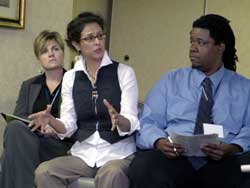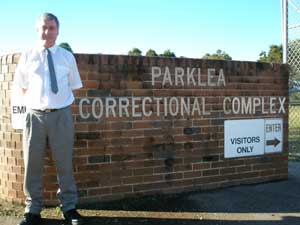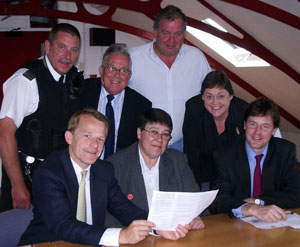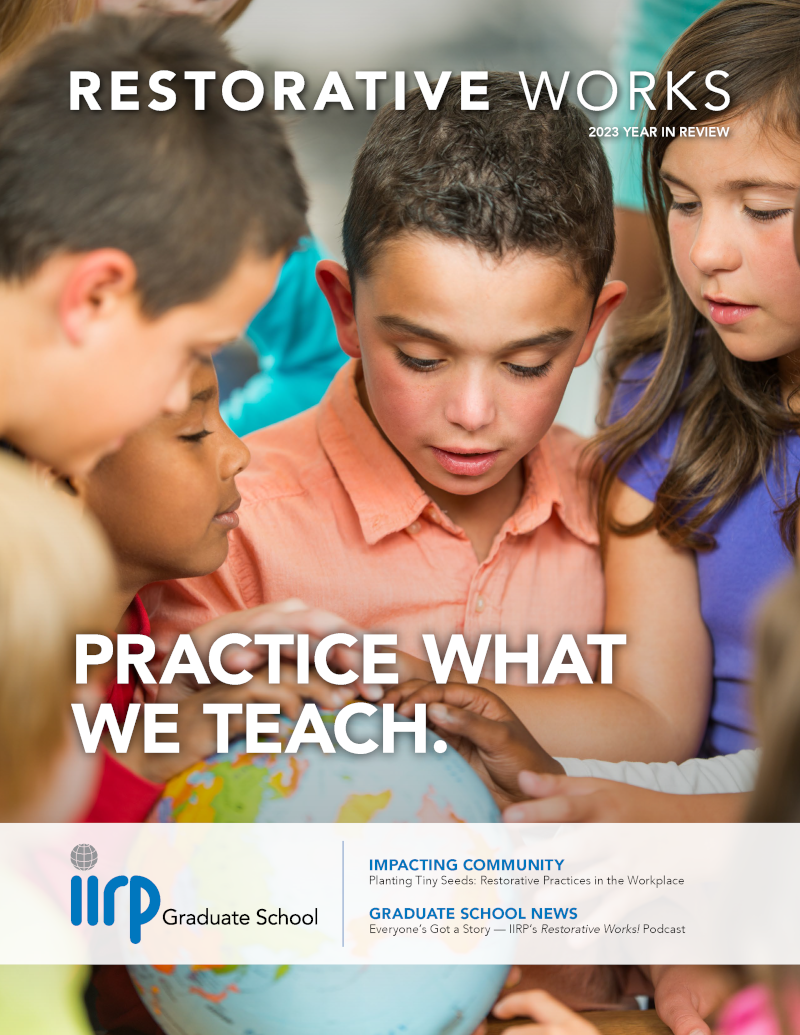News & Announcements
- Details
- Written by IIRP
View papers from the 8th International Conference on Conferencing held October 18-20, 2006, in Bethlehem, Pennsylvania, USA.
- Details
- Written by Laura Mirsky
 A lively discussion at “Down Country Roads, from Small Towns to Inner Cities: Restorative Justice in Illinois–See How it Works,” presented by Sally Wolf, Karen Lambert, Edith Crigler, Gary Balgemann, Elizabeth Vastine, Robert Spicer, D. Marie Goff, Donald Goff and Patricia Zamora. Photo by Thomas Kosa
A lively discussion at “Down Country Roads, from Small Towns to Inner Cities: Restorative Justice in Illinois–See How it Works,” presented by Sally Wolf, Karen Lambert, Edith Crigler, Gary Balgemann, Elizabeth Vastine, Robert Spicer, D. Marie Goff, Donald Goff and Patricia Zamora. Photo by Thomas KosaThe eighth International Conference on Conferencing, Circles and other Restorative Practices, "The Next Step, Developing Restorative Communities, Part 2," was a big success, according to participant feedback. The conference was held in the IIRP’s hometown of Bethlehem, Pennsylvania, USA, on October 18-20, 2006. More than 300 people joined in the three-day event, from Australia, Belgium, eight provinces of Canada, Costa Rica, England, Hungary, Ireland, Israel, the Netherlands, New Zealand, Northern Ireland, Norway, Scotland, South Africa, Sweden, Taiwan and 25 states of the USA, plus Washington, D.C. and Guam.
In the plenary sessions alone, four nations were represented: England, Scotland, Israel and the USA. More information on the conference, including the schedule, papers and participant comments are available here: http://www.iirp.edu/beth06/index.html.
As is always true at IIRP conferences, a feeling of community quickly developed among participants. Although most had never met before, attendees found that they had plenty to talk about regarding their restorative work, doing things with young people and adults, not to them or for them.
The enthusiasm for learning and sharing was palpable in and out of the official presentations. Many "breakout sessions" spilled into overtime as people compared notes on the nitty gritty of their restorative work. To cite one instance, the session: "Communities Within Communities: A Partnership Between a School-Based and Court-Based Restorative Program," led by Virginia Wiley of the Bluewater School District in Ontario, Canada, became a discussion about the issues session participants were facing implementing restorative programs in their own communities.
- Details
- Written by Laura Rush
Paper by Laura Rush, presented in a plenary session at "The Next Step: Developing Restorative Communities, Part 2," the IIRP''s 8th International Conference on Conferencing, Circles and other Restorative Practices, October 18-20, 2006.
- Details
- Written by Jean Kane, Gwynedd Lloyd, Gillean McCluskey, Sheila Riddell, Joan Stead, Elisabet Weedon
Paper by Gwynedd Lloyd, presented in a plenary session at "The Next Step: Developing Restorative Communities, Part 2," the IIRP''s 8th International Conference on Conferencing, Circles and other Restorative Practices, October 18-20, 2006.
- Details
- Written by Christopher Hey, Gail Ryan
Paper by Christopher Hey and Gail Ryan, presented in a plenary session at "The Next Step: Developing Restorative Communities, Part 2," the IIRP''s 8th International Conference on Conferencing, Circles and other Restorative Practices, October 18-20, 2006.
- Details
- Written by Anat Goldstein
Paper by Anat Goldstein, presented in a plenary session at "The Next Step: Developing Restorative Communities, Part 2," the IIRP''s 8th International Conference on Conferencing, Circles and other Restorative Practices, October 18-20, 2006.
- Details
- Written by Daniel Van Ness
Paper by Daniel Van Ness, presented in a plenary session at "The Next Step: Developing Restorative Communities, Part 2," the IIRP''s 8th International Conference on Conferencing, Circles and other Restorative Practices, October 18-20, 2006.
- Details
- Written by Mark Finnis, Paul Moran
Paper by Mark Finnis and Paul Moran, presented in a plenary session at "The Next Step: Developing Restorative Communities, Part 2," the IIRP''s 8th International Conference on Conferencing, Circles and other Restorative Practices, October 18-20, 2006.
- Details
- Written by Joshua Wachtel
 Graham Chaseling, creator of The Game, at Parklea Correctional Complex, New South Wales, AustraliaGrahame Chaseling, a 20-year veteran of corrections in New South Wales, Australia, critic of traditional criminal justice and restorative practices devotee for over 15 years, developed a unique model for supervising adult offenders in community-based programs. He calls it The Game.
Graham Chaseling, creator of The Game, at Parklea Correctional Complex, New South Wales, AustraliaGrahame Chaseling, a 20-year veteran of corrections in New South Wales, Australia, critic of traditional criminal justice and restorative practices devotee for over 15 years, developed a unique model for supervising adult offenders in community-based programs. He calls it The Game.
Chaseling discovered the limitations of punitive justice when he began work as a prison officer. He was disturbed to see inmates stripped of responsibility and free will: “From arrest to release from the criminal justice system, whether gaol [jail] or supervision... decisions will be made for them. Things will be done to them, or required of them. In terms of fair process or meaningful engagement, the chances are that very little will be achieved.”*
- Details
- Written by Laura Mirsky
 Members of Parliament David Laws and Nick Clegg meet with Chard Police beat manager William Geddes; CICJP implementation group chair John Lacey; Avon and Somerset Police chair Henry Hobhouse; CICJP coordinator Valerie Keitch and Somerset County Councilor Jill Shortland. Photo courtesy of Chard & Ilminster News.
Members of Parliament David Laws and Nick Clegg meet with Chard Police beat manager William Geddes; CICJP implementation group chair John Lacey; Avon and Somerset Police chair Henry Hobhouse; CICJP coordinator Valerie Keitch and Somerset County Councilor Jill Shortland. Photo courtesy of Chard & Ilminster News.
The people of the neighboring towns of Chard and Ilminster, in Somerset County, England, have taken justice in their community into their own hands. They established the Chard and Ilminster Community Justice Panel (CICJP) and are handling local cases themselves, in a restorative manner, with decidedly positive results.
What makes the CICJP different from other community justice boards is the restorative process. As in restorative conferences, as practiced by the IIRP, the CICJP brings victims, offenders and their supporters together face to face to deal with the consequences of an offense and decide how to repair the harm. Victims tell offenders how they have been affected by an offense, and offenders have a chance to take responsibility and make amends. Supporters express themselves, too.
Victims, offenders and their supporters are asked a series of restorative questions. Offender questions include “What happened?” and “Who do you think has been affected by your actions?” Victim questions include “How do you feel about what happened?” and “What has been the hardest thing for you?” At the end, all participants sign a conference agreement.

Restorative Works Year in Review 2023 (PDF)
All our donors are acknowledged annually in Restorative Works.
